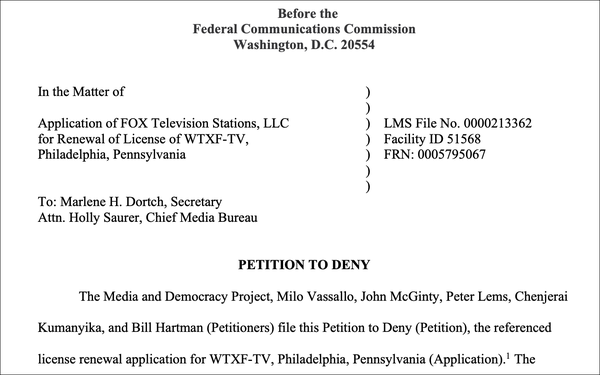Commentary
Activities That Shock The Conscience
- by Joe Mandese @mp_joemandese, July 7, 2023
Fox News Channel’s “stop the steal” 2020 election-denial coverage already is one of the costliest lies broadcast by Rupert Murdoch since he entered the U.S. TV news business in 1985, but his $787 million defamation suit settlement with Dominion Voting Systems would pale in comparison to the potential cost of a petition a non-partisan group filed with the Federal Communications Commission to deny Fox a broadcast license renewal.
The petition, filed by the Media and Democracy Project on July 6, “the 30th month anniversary of the Capitol insurrection, so far addresses only one of Fox’s stations, WTXF-TV, Philadelphia, which unlike cable, satellite and streaming distributed Fox News Channel, operates under a federal license and is beholden to the American public to broadcast responsibly.
advertisement
advertisement
Murdoch originally acquired WTFX-TV in 1994 for $200 million, which would be worth about $418 million in today’s dollars. And while the MAD petition doesn’t address Fox’s other owned stations, Murdoch has spent billions acquiring them over time, starting with his $3.5 billion purchase of the Metromedia stations in 1985 (worth more than $10 billion in today’s dollars).
“The intentional distortion of news, authorized at the highest levels of Fox’'s corporate structure, and fabricated by management and on-air personalities, represents a severe breach of the FCC's policy on licensee character qualifications… shocks the conscience,” MAD said in a statement announcing the petition to deny Fox’s license renewal.
“Owning a broadcast station is more than a business – it is a public trust,” the statement continues, adding, “Never before has the commission been confronted with so much evidence attached to a petition that clearly shows that an FCC broadcast licensee undermined that trust.”
It’s hard to say what the real cost of a denial of Fox’s broadcast license – or potentially licenses – might be, given that the entire infrastructure of its television business has shifted from broadcast to cable and streaming models, but those other platforms are not licensed by the federal government and are not beholden to the public trust.
Why not?
Great question.
Here’s another, at a time when more Americans get their news from social media platforms than from broadcasters or newspaper publishers, who are somewhat regulated, why aren’t internet distributed sources of news and information not similarly regulated?
Section 230 anyone?




